Born in Tully Lumb, Perth in 1878. Died in
Edinburgh in 1950. He married Agnes Baxendine in 1930.
His books include "Story Recitals" and
"Five-Minute Recitations" and many others and this one featured below...
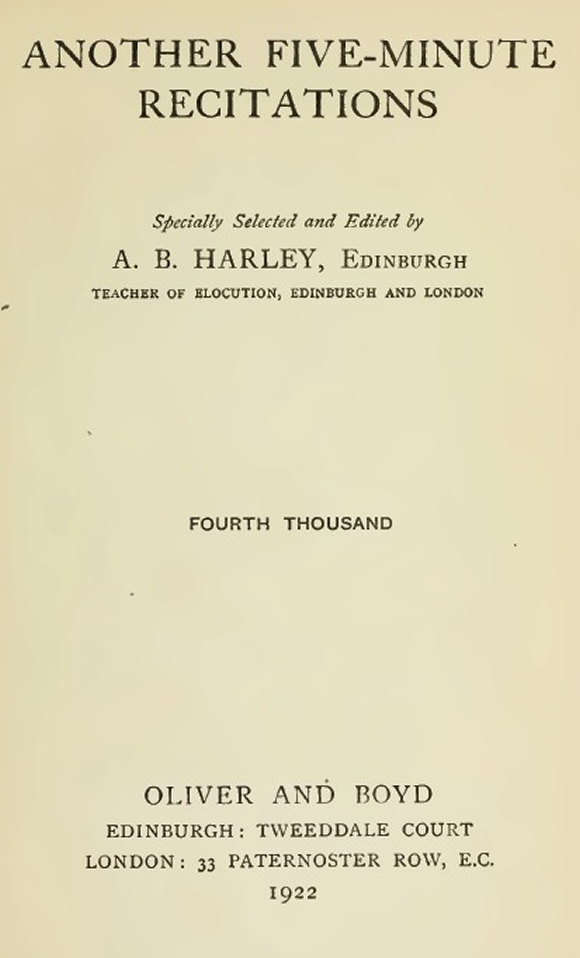
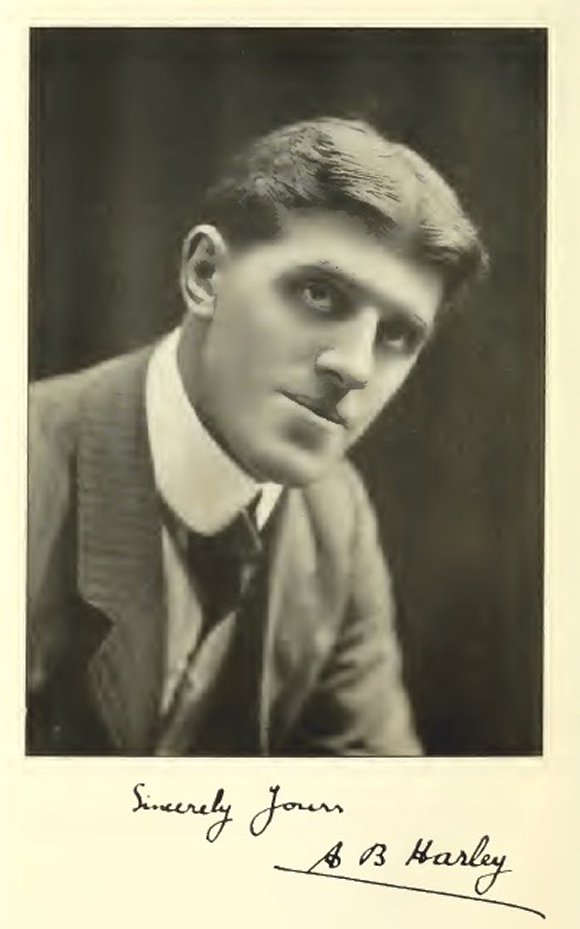
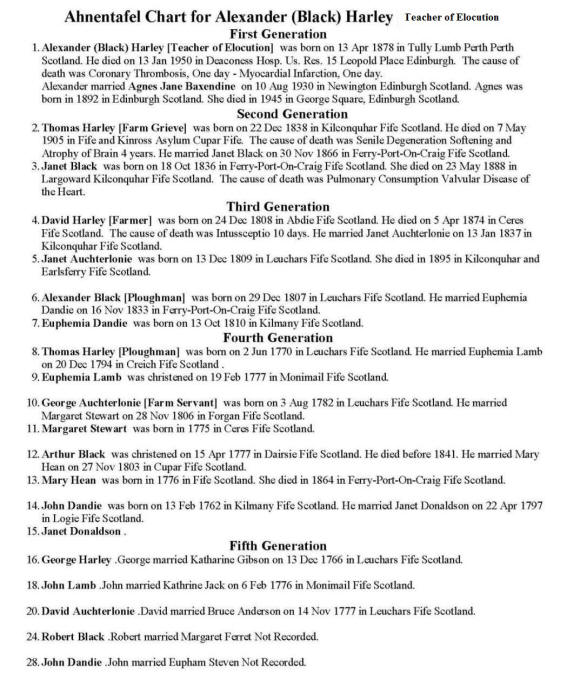
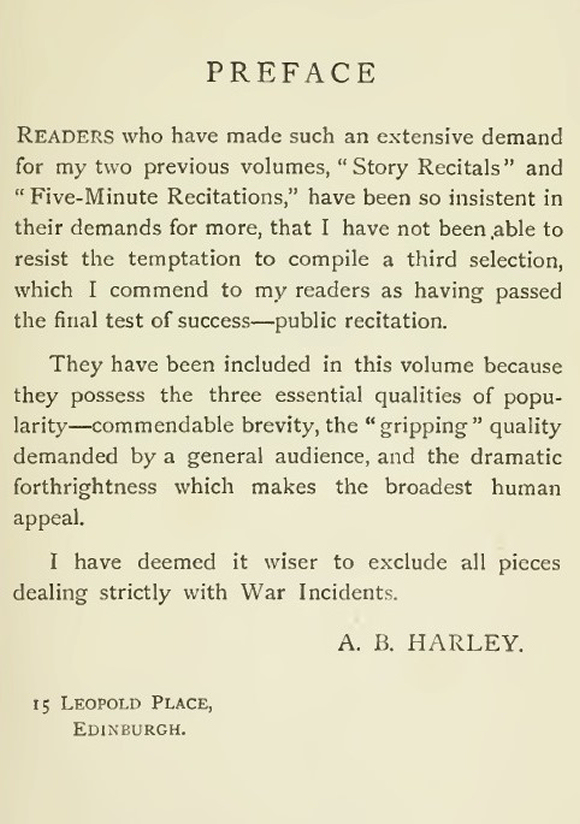
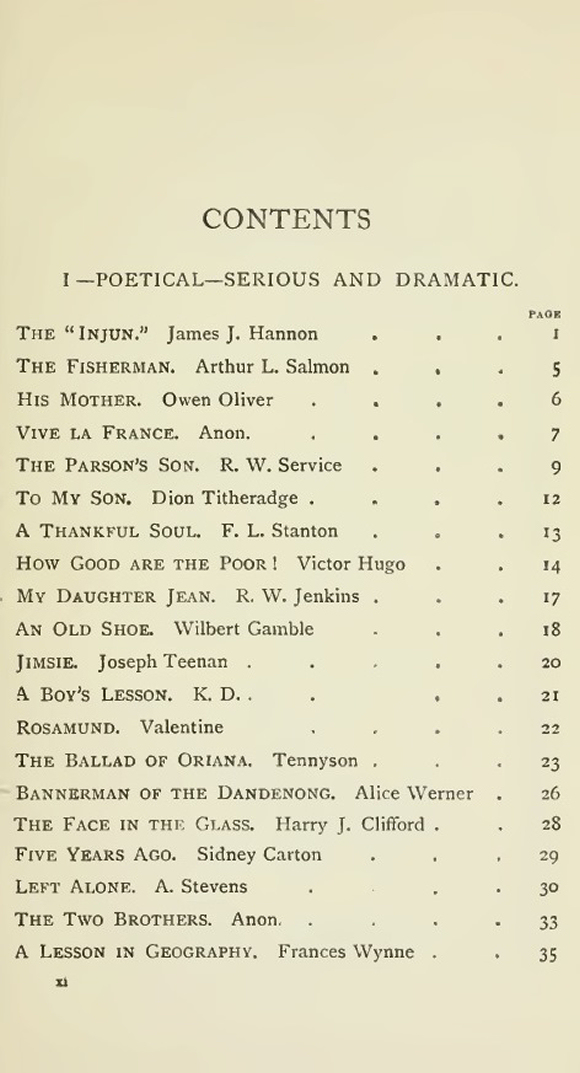
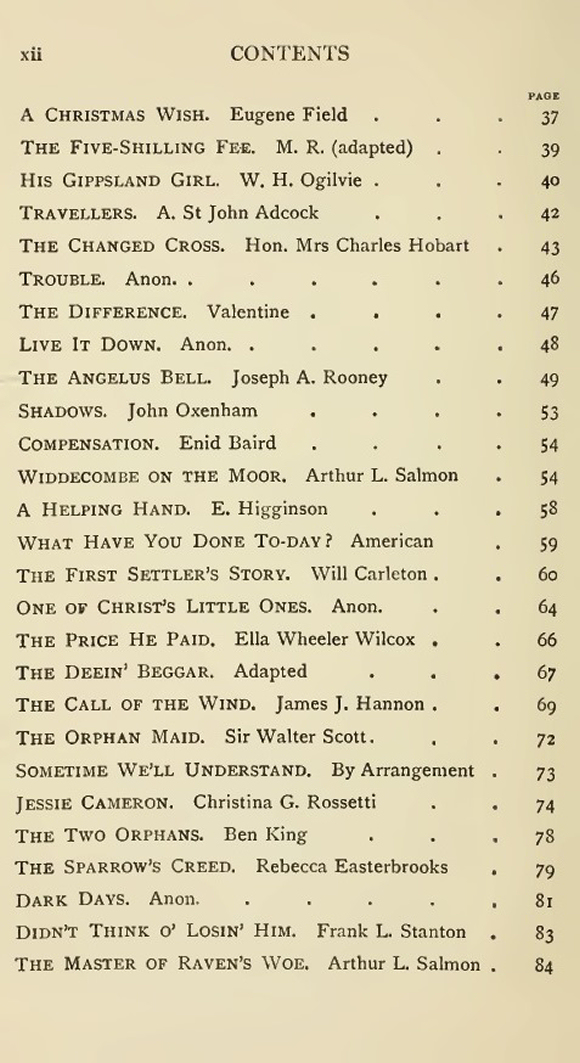
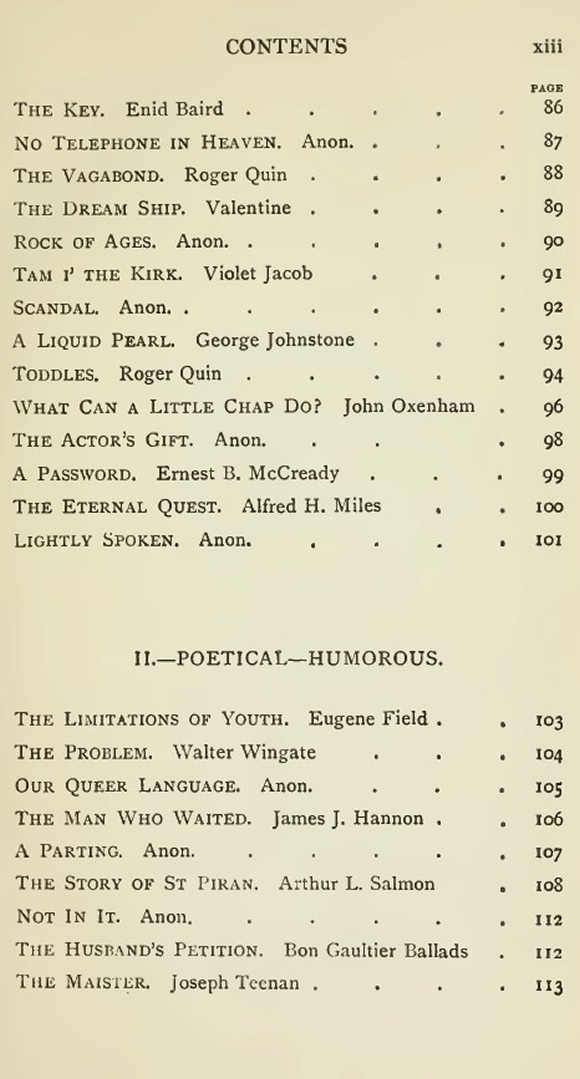
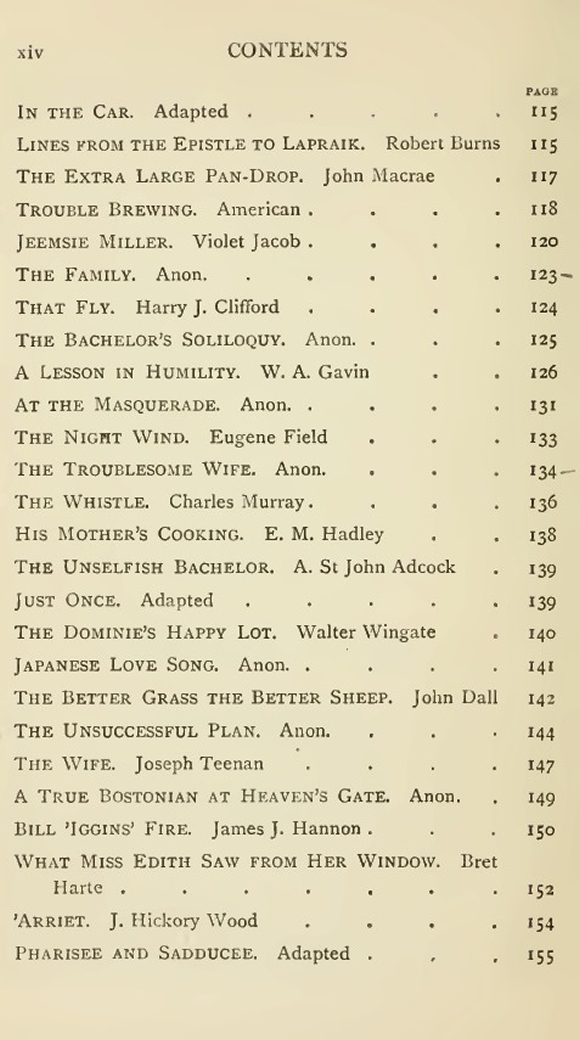
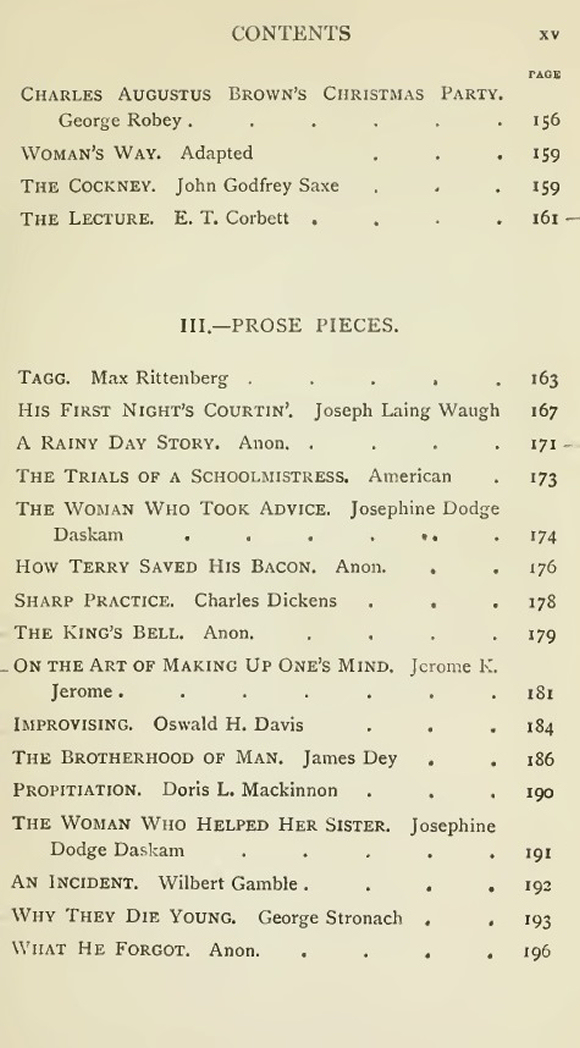
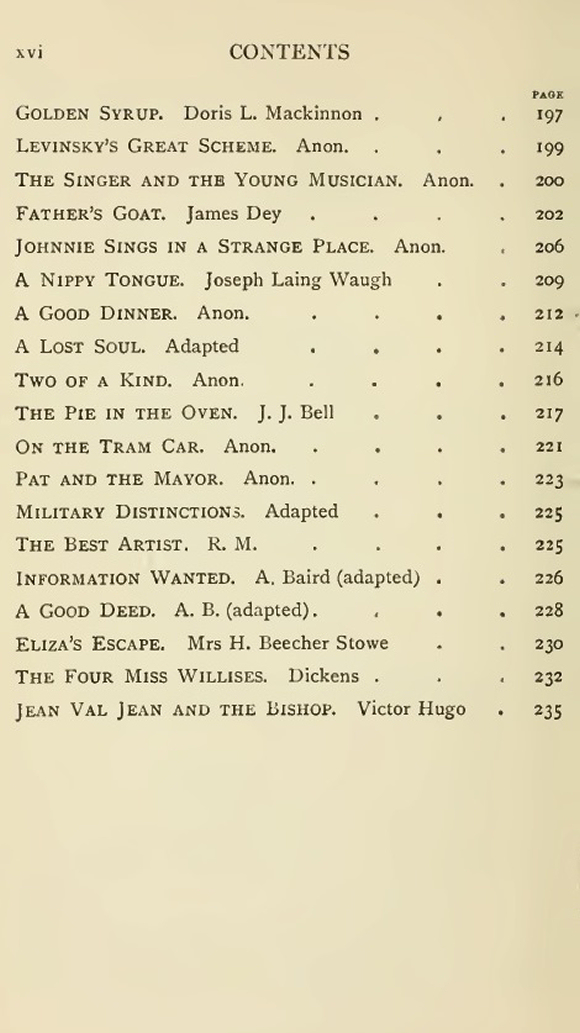
Have split up this book into three
sections...
Poetical, Serious and Dramatic
Poetical - Humorous
Prose Pieces
And here are a wee selection of other poems
he selected for his books...
JEEMSIE MILLER
There's some that mak' themselves a name
Wi' preachin', business, or a game ;
There's some wi' drink hae gotten fame,
And some wi' siller ;
I kent a man got glory cheap,
For nane frae him their een could keep,
Losh ! he was shapit like a neep,
Was Jeemsie Miller.
When he gaed drivin' doon the street,
Wi' cairt an' sheltie a' complete,
The plankie whaur he had his seat
Was bent near double ;
An' gin yon wood had na' been Strang
It hidna' held oor Jeemsie lang,
He had been landit wi' a bang,
And there'd been trouble.
Ye could but mind to see his face,
The reid mune glowerin' on the place,
Nae man had e'er sic muckle space
To haud his bonnet ;
And owre yon bonnet on his brow
Set cockit up owre Jeemsie's pow
There waggit, reid as lichtit tow,
The toorie on it.
And Jeemsie's poke was brawly lined,
There wasna' mony couldna' find
His cantie hoosie i' the wynd—
" The Salutation " ;
For there ye'd get, wi' sang an' clink,
What some ca'd comfort, wi' a wink ;
And some that didna' care for drink
Wad ca' damnation !
But dinna' think, altho' he made
Sae grand a profit o' his trade,
An' muckle i' the bank had laid,
He wadna' spare o't ;
For, happit whaur it wasna' seen,
He'd aye a dram in his machine.
An' never did he meet a freen'
But got a share o't.
Ae day he let the sheltie fa',
(Wheest, sirs ! he wasna' fou—na, na !)
A wee thing pleasant—that was a',
An drivin' canny ;
Fegs, he cam' hurlin' owre the front,
An' struck the road wi' sic a dunt,
Ye'd thocht the causey got the brunt,
An' no' the mannie.
Aweel, it was his hin'most drive,
Aifter yon clout he couldna' thrive,
For twa pairts deid, an' ane alive,
His billies foond him ;
And, bedded then, puir Jeemsie lay,
And a' the nicht and a' the day
Relations cam' to greet and pray
And gaither roond him.
Said Jeemsie, " Cousins, gie's a pen,
Awa' an' bring the writer ben,
What I hae spent wi' sinfu' men
I weel regret it ;
In deith I'm sweir to be disgrac't,
I've plenty left forbye my waste,
An' them that I've neglected maist,
It's them'll get it."
It was a sicht to see them rin
To save him frae the sense o' sin,
Fu' sune they got the writer in,
His mind to settle;
And oh, their loss, sae sair they felt it,
To a' the toon in tears they telt it,
Their dule for Jeemsie wad hae meltit
A he'rt o' metal.
Puir Jeemsie de'ed. In a' their braws
The faim'ly cam', as black as craws :
Men, wives, an' weans wi' their mammas
That scarce could toddle !
They grat—an' they had cause to greet !
The will was read that gar'd them meet—
The U.P. Kirk, just up the street,
Got ilka bodle !
by Violet Jacob.
From "Songs of Angus"
by kind permission.
THE DEEIN' BEGGAR
When deep the snaw had wreathed the muir
An' the wintry win' was swellin',
The beggar, blin' an' auld an' puir,
Socht shelter in oor dwellin'.
Oh he had seen a better day
Ere freen's an' fortune fled him,
But noo nae freen' on the earth had he
But the little doug that led him.
We took him frae the angry storm
An' the cauld blast whaur we fand him ;
We made his bed baith saft and warm
An' we row'd his plaidie roond him.
You've kindly opened me your door,
Sae sune as e'er ye heard me,
Tho' I am auld an' blind an' puir—
But heaven will yet reward ye.
Sae bring your bairnies here to me,
Let nane o' them be missin',
An' tho' I've naething mair to gie,
They'll get an auld man's blessin'.
He blessed the bairnies ane by ane,
" May puirtith ne'er oppress ye,"
An' oh be guid whan I am gane,
An' God hissel will bless ye.
You'll a' be kind to Collie here,
An' share wi' him your coggie ;
Sae fare ye well, my bairnies dear,
An' my doggie ! Oh ! my doggie.
He turned him round, he spak nae mair,
Nae kindness could restore him ;
To God he breathed a silent prayer,
An' the shades o' death cam' o'er him.
Anonymous
THE FIVE-SHILLING FEE
My mither was wae for my faither was deid,
And they threatened to tak the auld hoose ower her heid ;
Her earnings were scanty, the meal it grew dear,
I, the eldest o' five, could whiles see the tear
Glisten bricht in her ee, as she cam hame at e'en,
Half-hid as it didna just want to be seen ;
I spak na a word, but ma hert it would ache,
And I wisht I were big for my puir mither's sake.
The farmers around wanted herds for their kye,
And ma mither said she had ane that wad try ;
I min' how I trembled wi' half-fear, half-joy,
When a farmer ca'd in for to look at the boy.
He bad me stan' up, an' he thocht I was wee,
But ma blithe, honest face, he said, pleased his ee ;
He wad tak me and try me a half-year and see,
For a pair o' new shoon and a five-shilling fee.
We were glad to hear tell o't, a bargain was struck,
An' he gied me a saxpence o' erles for luck ;
Ma trousers and jaicket were patched for the day,
And ma mither convoyed me a lang mile away.
Wi' chairges and warnings 'gainst a' sort o' crimes,
And rules she laid doon I thocht hard at the time—
Gin the kye should rin wrang I was never to lee,
Tho' they sent me awa withoot shoon or ma fee.
Syne I set to ma wark, and I pleased richt weel,
For a wag o' the hand I plied hand or heel ;
But ma troubles cam on, for the fences were bad,
An' the midsummer flees gar'd the cattle run mad,
And the cauld blashy weather sair drenched me wi' rain,
Whiles wee thochts o' leevin' would steal through ma brain ;
But wi' courage I dashed aye the tear fra ma ee
When I thocht o' ma shoon and ma five-shilling fee.
Syne Martimas brocht me ma lang-look'd-for store,
And proudly I coonted it twenty times o'er.
Some years have now passed in a fortunate train,
But I never have felt such a rapture again.
The sailor just safe thro' the wild breakers steered,
Proud Waterloo's Victor when Blucher appeared
N'er felt what I felt, when I placed on the knee
O' a fond-hearted mother my five-shilling fee.
By M.R.
THE MAISTER
He gi'ed us Scripture names to spell,
But what they meant we couldna' tell
He maybe didna' ken hissel'—
The maister.
What funny dogs we used to draw
Upon oor sklates, an' ships, an' a',
Till keekin' roond, wi' fright we saw—
The maister.
He gi'ed oor lugs a fearfu' pu',
Said he would skelp us black an' blue ;
I doot he wadna' try that noo—
The maister.
We mind them weel—his lang black tawse,
They nappit sair like partens' claws ;
A crabbit little man he was—
The maister.
He birled me roond like Nannie's wheel,
Said he was telt tae lick me weel ;
He seemed tae like tae hear me squeal—
The maister.
His plump, roond cheeks as red's the rose,
His twinklin' een an' redder nose
Showed that he suppit mair than brose—
The maister.
He opened aye the schule wi' prayer,
An' psalms an' questions gi'ed us mair
Than what we thocht was proper there—
The maister.
An' after time an' siller spent,
We left as wise as when we went ;
It wasna' muckle that he kent—
The maister.
It's forty years noo since that day,
An' Time, wha's besom's aye at play,
'Mang other things, has soopt away—
The maister.
Joseph Teenan.
By kind permission of Nimmo, Hay and Mitchell.
THE PROBLEM
by Walter Wingate
The best o' bein' a bachelor
Is the fash that ye dinna' gie ;
For naebody frets about how ye get on,
Or greets very sair when ye dee.
The best o' bein' a marriet man—
There's ane ye hae aye at your ca ;
To do a bit darnin' and look for your specs,
And thinks ye nae bother ava.
The warst o' bein' a bachelor,
Ye're just like a cow among corn ;
It's fine—but ye ken that ye sudna' be there ;
It wisna' for that ye were born.
The warst o' bein' a marriet man.
Is just that ye aye hae a wife
To girn about pickles o' snuff on your coat,
For the term o' your natural life.
There's this about bein' a bachelor—
It maun be the best o' the twa ;
For frae a' we hear tell o' the angels in heaven,
There's nane o' them marriet ava—
But then there's the chance, wi' a marriet man—
It's this mak's a body sae fain—
O' catchin' a bonnie wee angel down here,
And startin' a heaven o' your ain.
I've coontit it up, I've coontit it down,
But there seems to be nae ither plan—
Than just to keep bidin' a bachelor ;
Or else be a marriet man.
From poems by WALTER WlNGATE.
By kind permission of the Publishers,
Gowans and Gray, Glasgow.
IN THE CAR
One day I observed in a crowded horse-car,
A lady was standing. She had ridden quite far,
And seemed much disposed to indulge in a frown,
As nobody offered to let her sit down.
And many there sat who, to judge by their dress,
Might a gentleman's natural instincts possess,
But who, judged by their acts, make us firmly believe
That appearances often will sadly deceive.
There were some most intently devouring the news,
And some thro' the windows enjoying the views;
And others indulged in a make-believe nap,
While the lady still stood holding on by the strap.
At last a young Irishman, fresh from the "sod,"
Arose with a smile and most comical nod,
Which said quite as plain as in words could be stated
That the lady should sit in the place he'd vacated.
"Excuse me," said Pat, " that I caused you to wait
So long before offerin' to give you a sate,
But in troth I was only just waitin' to see
If there wasn't more gintlemin here beside me."
Anonymous
JUST ONCE
It was a pitiful mistake, an error sad and grim ;
I waited for the railway train, the light was low and dim.
It came at last, and from the car there stepped a dainty dame,
And looking up and down the place, she straight unto me came.
" Oh, Jack ! " she cried, " Oh, dear old Jack ! " and kissed me as she
spake ;
Then looked again and frightened cried : " Oh, what a bad mistake ! "
I said : " Forgive me, maiden fair, that I am not your Jack,
And as regards the kiss you gave, I'll straightway give it back."
And since that night I have often stood on the platform lighted dim,
But only once in a man's whole life do such things come to him.
Anonymous
PHARISEE AND SADDUCEE
By Anonymous 'Punner'
Together to the church they went,
Both doubtless on devotion bent.
The parson preached with fluent ease
On Pharisees and Sadducees.
And as they homeward slowly walked,
The lovers on the sermon talked.
And he—he dearly loved the maid—
In soft and tender accents said,
"Darling, do you think that we
Are Pharisee and Sadducee?"
She flashed on him her bright blue eyes
With one swift look of vexed surprise,
And as he hastened to aver
He was her constant worshipper,
"But, darling, I insist, said he,
That you are very Phar-i-see,
I don't think you care much for me.
That makes me so Sad-u-cee."
THE TROUBLESOME WIFE
A man had once a vicious wife
(A most uncommon thing in life);
His days and nights were spent in strife
Unceasing.
Her tongue went glibly all day long,
Sweet contradiction still her song,
And all the poor man did was wrong,
And ill done.
A truce without doors, or within,
From speeches, long as tradesmen spin,
Or rest from her eternal din,
He found not.
He every soothing art displayed,
Tried of what stuff her skin was made ;
Failing in all, to Heaven he prayed
To take her.
Once, walking by the river's side,
In mournful tones, " My dear," he cried,
"No more let feuds our peace divide ;
I'll end them."
"Weary of life, and quite resigned,
To drown, I have made up my mind,
So tie my hands as fast behind
As can be,
Or nature may assert her reign,
My arms assist, my will restrain,
And, swimming, I once more regain
My troubles."
With eager haste the dame complies,
While joy stands glistening in her eyes ;
Already, in her thoughts, he dies
Before her.
"Yet when I see the rolling tide,
Nature revolts, he said ; beside,
I would not be a suicide,
And die thus."
"It would be better far, I think,
While close I stand upon the brink,
You push me in ; nay, never shrink,
But do it."
To give the blow the more effect,
Some twenty yards she ran direct,
And did what she could least suspect
She should do.
He steps aside, himself to save ;
Lo ! souse, she dashes in the wave,
And gave, what ne'er before she gave,
Much pleasure.
"Dear husband, help ! I sink !" she cried.
"Thou best of wives," the man replied,
"I would, but you my hands have tied ;
Heaven help you!"
Anonymous
THE WIFE
She vexes me an' touts me sair,
Sets hope adrift an' brings despair,
An' in her anger pu's my hair—
The wife.
The Scripters speak o' sorrow's cup,
A tubfu' I'm compelled to sup !
She mak's me whist an' drink it up—
The wife.
If ye braw leddies dinna' ken
The way tae tease an' kill the men,
Consult yer humbler sister then—
The wife.
Like ony other simple fule
I entered matrimony's schule,
She very soon proclaimed " Home Rule"—
The wife.
The loss o' freens I noo deplore,
-The joys are fled I kent before,
Against me whiles she locks the door—
The wife.
She tries to ape the upper ten—
Sic wives are no' for vvorkin' men ;
She's ower vveel off an' disna' ken—
The wife.
She says she's far ower guid for me
An' brags aboot her pedigree ;
My worth, of course, she canna' see—
The wife.
Wi' her, it is a thing of course
Tae keep possession o' the purse,
Which mak's me like a heathen curse—
The wife.
My books she flings aside as trash,
Ca's me a guid-for-naething hash !
An' yet I wadna' like tae thrash—
The wife.
When I'm engaged in company,
She clanks the bairn upon my knee,
A mere man-nurse she mak's o' me—
The wife.
Then wi' her besom an' her cloot,
She sets tae wark tae dust an' scoop,
An' that's the way she gets them oot—
The wife.
Wi' fricht the laddies roar an' nn,
Outside she gi'es the cat the fling ;
She fair distracts me wi' her din—
The wife.
They say I'm thin aboot the jaws,
An' like a thing for frichtin' craws ;
I wish they wud remove the cause—
The wife.
I'm losin' flesh, I'm gettin' grey,
I find I'm wearin' doon the brae ;
She'll maybe change when I'm away—
The wife.
Joseph Teenan.
By kind permission of
Messrs Nimmo, Hay & Mitchell.
Prose Pieces in various Scottish dialects selected by
Alexander Black HARLEY that appear within three of his
books, namely,
"Story Recitals" (1909)
01. A School
Examination
02. Burns' Night At Fallinbrae
03. Foxes' Tails
04. David And Goliath
05. Wee Teeny
06. Through Death's Dark Vale
07. Oh! Christina!
08. Maister Ridhorn's Toilet
09. The Pig In A Poke
"Five-Minute Recitations" (1913)
10. The Last Journey
11. Sugar For Naething
12. Hobbies
13. The Twa Texts
"Another Five-Minute Recitations" (1922)
14. The Brotherhood O' Man
15. Johnnie Sings In A Strange Place
16. A Nippy Tongue
17. The Pie In The Oven
|

